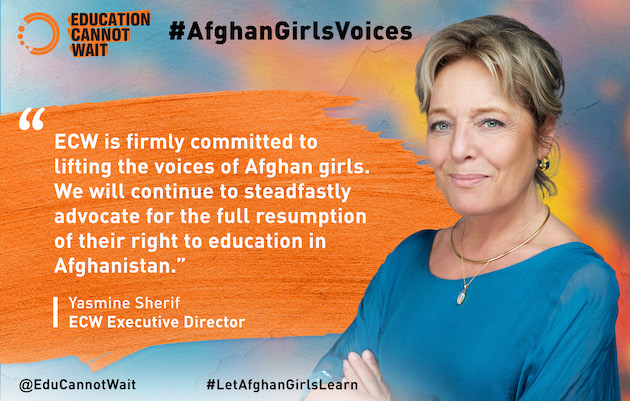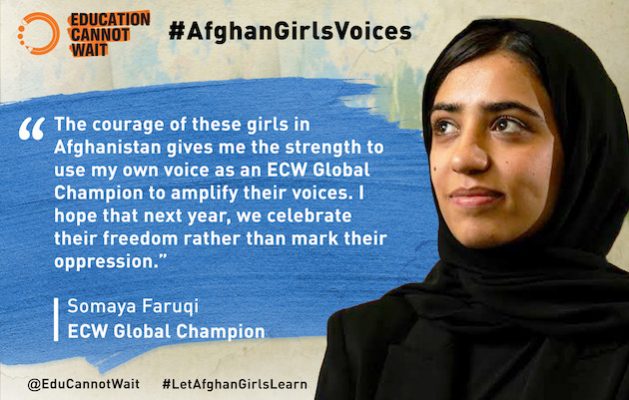NAIROBI, Aug 14 (IPS) – Two years ago, the then 19-year-old Somaya Faruqi and the Afghan Robotic Team travelled from Herat City to Kabul, the heart of Afghanistan—the Taliban had taken over Herat city, cutting off electricity and internet. The all-girls team’s great passion for science, technology, engineering, and math (STEM) had driven them to Kabul to rehearse for a competition.
“After three days, I woke up, looked outside the window, and saw the Taliban in the streets. I was very shocked and could not believe it. I never imagined that the Taliban could take over Kabul. There were thousands and thousands of people trying to flee the country, and after three days of trying, we flew to Qatar with the help of the Qatari government. I wondered what would become of my sister and classmates who were left behind,” Faruqi tells IPS.
It did not take long for the de facto authority to unveil their plans. Two years down the line, the Taliban has waged a gender war and women and girls are on the receiving end. The Taliban edict has banned adolescent girls from the classrooms. After year six, they are to stay at home, says Yasmine Sherif, Executive Director of Education Cannot Wait (ECW)—the United Nations global fund for education in emergencies and protracted crises.

“Afghan girls are banned from accessing secondary and tertiary education because of their gender, and this is the most ruthless form of discrimination. They cannot understand why they are not allowed to attend school like their brothers. Their pathway to education has been cut, and they are in pain, suffering and (often) struggling with suicidal thoughts. We must stand in solidarity with them, for in the words of Martin Luther King Jr, injustice anywhere is injustice everywhere. Their distress should shake us to the core,” Sherif tells IPS.
She says that the situation in Afghanistan is one of the worst in the world. To elevate Afghan girls’ voices on the global stage, ECW has launched the #AfghanGirlsVoices Campaign. A compelling, poignant campaign developed in collaboration with Faruqi, who is an ECW Global Champion.
Faruqi finished her 12th grade in Qatar, from where she applied to college and received a scholarship from the Qatar Fund for Development to pursue engineering studies in the United States. Her astounding progress and brilliance are a testament to the devasting blow being dealt to millions of Afghan girls.
“The situation in Afghanistan gets worse from one day to the next. Women and girls are prisoners in their own homes, in their own country. They cannot leave their homes without a male guardian- a father, brother or relative. They have been denied the freedom to pursue any interest outside their home, and they sit around with nothing to do. Through this campaign, I want the world to know that there is a country today where girls are denied fundamental human rights, forced out of school and into marriages,” Faruqi explains.
The campaign is to be launched on August 15, the second anniversary of the Taliban’s takeover of Afghanistan. is in Gordon Brown—UN Special Envoy for Global Education and Chair of ECW’s High-Level Steering Group on the eve of the launch, stressed the need for the international community must hear this poignant call from the heart of Afghan girls and young women.
Faruqi affirms the need to hear from those inside Afghanistan, at the very heart of the ongoing injustice, to hear how their lives have been turned upside down and how a fragile future now hangs in the balance if the global community remains silent.
Sherif says the situation is particularly horrific because girls are simply not being left behind in the education system due to conflict or climate disaster; an official ban is keeping them out of school. As a firm fist pushes millions of girls out of school, the immediate impact is a rolling back of time to a place where women lived in the shadows. This devastating decree means that 50 percent of the population is not able to access education.
“This is not reflective of Islam. The foundation of Islam is learning. The first word in the Quran is read. It does not advocate for girls not to go to school. The ban is unacceptable,” she emphasizes.
The campaign uses moving images by a young Afghan female artist and determined testimonies from Afghan girls. It features a series of equally inspiring, heart-wrenching and determined testimonies from Afghan girls whose lives have been abruptly upended by the ban preventing them to pursue their education and dreams.
Their powerful words are conveyed together with striking illustrations depicting both the profound despair experienced by these Afghan girls and young women, along with their incredible resilience and strength in the face of this unacceptable ban on their education.
ECW invites partners and the wider public to stand in solidarity with Afghan girls by posting messages from Afghan girls across social media every day—from 15 August, the date when the de facto Taliban authorities came into power in Afghanistan 2021, until 18 September, which marks the start of the official ban on school for adolescent girls.
Sherif says the campaign is in line with sustainable development goal 4 and will run through the UN General Assembly on Sustainable Development Goals (SDG) Summit from 18-19 September at the UN General Assembly in New York. The Summit aims to mark the beginning of a new phase of accelerated progress towards the SDGs with high-level political guidance on transformative and accelerated actions leading up to 2030 – progress that cannot be achieved with Afghan girls left behind.
“ECW, through our in-country partners, has invested in formal and non-formal education in Afghanistan since 2014. More than 70 percent of the Afghan population is in dire humanitarian need. It is a country on the brink of collapse in terms of people’s well-being. We are therefore calling for urgent funding to continue to fund community-based education through our grassroots organizations. We should never stop supporting Afghanistan; people are suffering,” Sherif emphasizes.
ECW has been supporting education programmes in Afghanistan since 2017. The ECW-supported extended Multi-Year Resilience Programme (MYRP) in Afghanistan supports more than 250,000 children and adolescents across some of the most remote and underserved areas of the country. The programme delivers community-based education, organised at the local level with support from local communities, and is critical to keep education going. Girls account for over half of all the children and adolescents reached by the MYRP.
IPS UN Bureau Report
Follow @IPSNewsUNBureau
Follow IPS News UN Bureau on Instagram
© Inter Press Service (2023) — All Rights ReservedOriginal source: Inter Press Service

